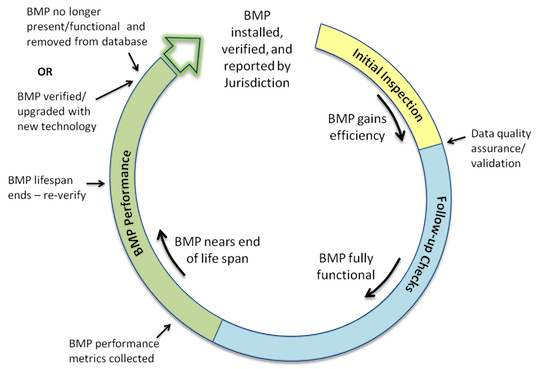The implementation, tracking and reporting of best management practice (BMP) data has been at the center of Maryland's restoration efforts for many years.
The Chesapeake Bay Program (CBP) partners have formally defined BMP verification as “the process through which agency partners ensure practices, treatments and technologies resulting in reductions of nitrogen, phosphorus and/or sediment pollutant loads are implemented and operating correctly.” BMP verification can be viewed as a life cycle process that includes initial inspection, follow-up checks, maintenance and evaluation of BMP performance.

(Picture from CBP Website)
Properly installed and functioning conservation, or mitigation, practices reduce the amounts of nutrients and sediment entering local waters and the tidal Chesapeake Bay. In addition, these practices can help reduce local flooding, protect sources of drinking water, reduce the number of harmful algal blooms and support local economies through the return of clean water and viable habitats suitable for wildlife and recreational activities. Improperly installed or non-functioning BMPs do little to mitigate the effects that nutrient and sediment runoff can have on local waterways, and in some cases may cause adverse impacts to waterways and the Chesapeake Bay.
In 2012, the CBP partners developed and adopted a set of five BMP verification principles to both guide the development of the verification guidance and to establish the basis upon which to evaluate the development and implementation of enhanced jurisdictional BMP verification programs. The principles provide the common bar with which partners could judge the distinct components of the framework to ensure their programs are synchronized with the expectations of the CBP and general public.
| Principle |
Description |
|
Practice Reporting
|
Affirms that verification is required for practices, treatments and technologies reported for nitrogen, phosphorus and/or sediment pollutant load reduction credit through the Bay Program. This principle also outlines general expectations for BMP verification protocols.
|
|
Scientific Rigor
|
Asserts that BMP verification should assure effective implementation through scientifically rigorous, defensible and professionally established and accepted sampling, inspection and certification protocols. Recognizes that BMP verification shall allow for varying methods of data collection that balance scientific rigor with cost effectiveness and the priority placed upon the practice in achieving pollution reduction.
|
|
Public Confidence
|
Calls for BMP verification protocols to incorporate transparency in both the processes of verification and of tracking and reporting the underlying data. Recognizes that levels of transparency will vary depending upon source sector, acknowledging existing legal limitations and the need to respect individual confidentiality to ensure access to non-cost shared practice data.
|
|
Adaptive Management
|
Recognizes that advancements in practice reporting and scientific rigor, as described above, are integral to assuring desired long-term outcomes while reducing the uncertainty found in natural systems and human behaviors. Calls for BMP verification protocols to recognize existing funding and allow for reasonable levels of flexibility in the allocation or targeting of funds.
|
|
Sector Equity
|
Calls for each jurisdiction’s BMP verification program to strive to achieve equity in the measurement of functionality and effectiveness of implemented BMPs among and across the source sectors.
|
Maryland was asked to provide documentation to the CBP and the U.S. Environmental Protection Agency regarding how the jurisdiction verifies the existence of its BMP and inspection methods. Below are the State's final verification protocols that were reviewed and accepted by the CBP and EPA.
Maryland's Best Management Practice Verification Protocols (revised January 2025)
Other Links
Contact Information
Please direct questions or comments to [email protected] or call 410-537-3818.
| Acrobat® Reader is required to view and print the PDF files. If you do not have it click on the icon to the right. |
 |